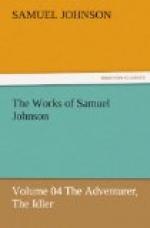But when thoughts and words are collected and adjusted, and the whole composition at last concluded, it seldom gratifies the author, when he comes coolly and deliberately to review it, with the hopes which had been excited in the fury of the performance: novelty always captivates the mind; as our thoughts rise fresh upon us, we readily believe them just and original, which, when the pleasure of production is over, we find to be mean and common, or borrowed from the works of others, and supplied by memory rather than invention.
But though it should happen that the writer finds no such faults in his performance, he is still to remember, that he looks upon it with partial eyes: and when he considers, how much men, who could judge of others with great exactness, have often failed of judging of themselves, he will be afraid of deciding too hastily in his own favour, or of allowing himself to contemplate with too much complacence, treasure that has not yet been brought to the test, nor passed the only trial that can stamp its value.
From the publick, and only from the publick, is he to await a confirmation of his claim, and a final justification of self-esteem; but the publick is not easily persuaded to favour an author. If mankind were left to judge for themselves, it is reasonable to imagine, that of such writings, at least, as describe the movements of the human passions, and of which every man carries the archetype within him, a just opinion would be formed; but whoever has remarked the fate of books, must have found it governed by other causes than general consent arising from general conviction. If a new performance happens not to fall into the hands of some who have courage to tell, and authority to propagate their opinion, it often remains long in obscurity, and perishes unknown and unexamined. A few, a very few, commonly constitute the taste of the time; the judgment which they have once pronounced, some are too lazy to discuss, and some too timorous to contradict; it may however be, I think, observed, that their power is greater to depress than exalt, as mankind are more credulous of censure than of praise.
This perversion of the publick judgment is not to be rashly numbered amongst the miseries of an author; since it commonly serves, after miscarriage, to reconcile him to himself. Because the world has sometimes passed an unjust sentence, he readily concludes the sentence unjust by which his performance is condemned; because some have been exalted above their merits by partiality, he is sure to ascribe the success of a rival, not to the merit of his work, but the zeal of his patrons. Upon the whole, as the author seems to share all the common miseries of life, he appears to partake likewise of its lenitives and abatements[1].
[1] See a pamphlet entitled “The Case of Authors
by Profession,” 8vo.
1758. It is the production
of Mr. James Ralph, who knew from painful
experience the bitter evils
incident to an employment which yielded
a bare maintenance to Johnson
himself. For anecdotes of Ralph, and
the work alluded to, see Dr.
Drake’s Essays on Rambler, &c. vol. i.
p. 96.




